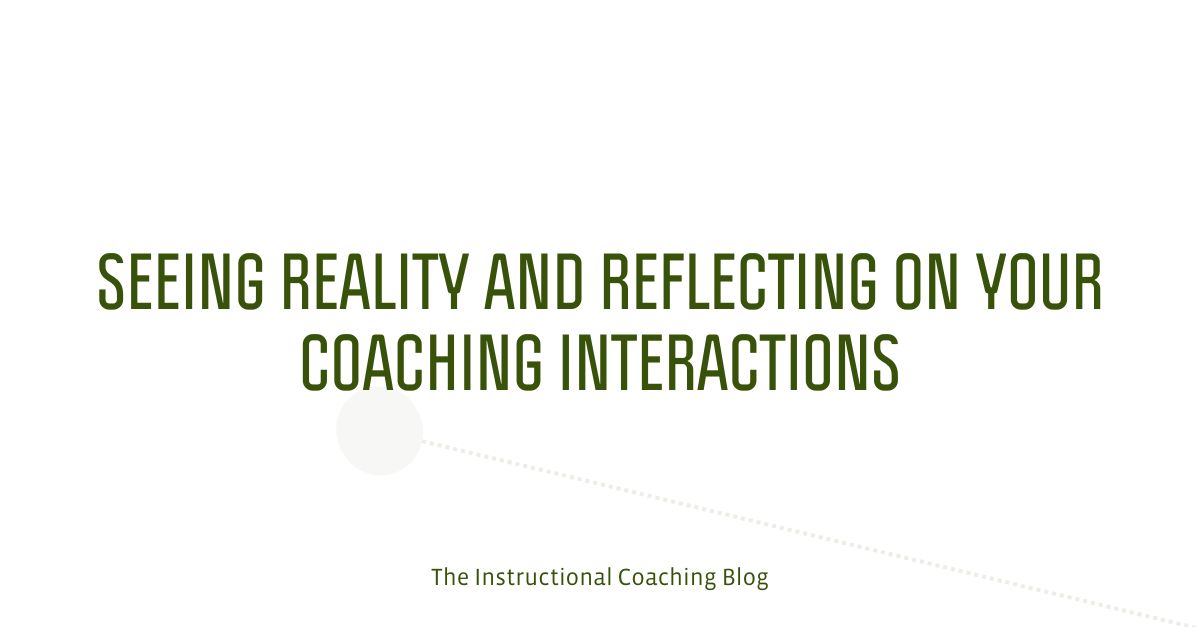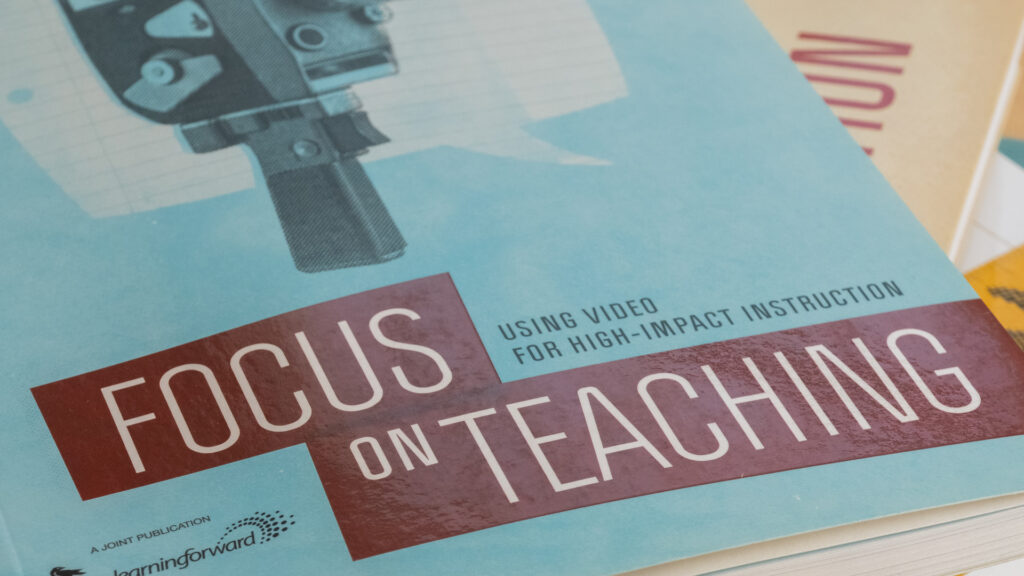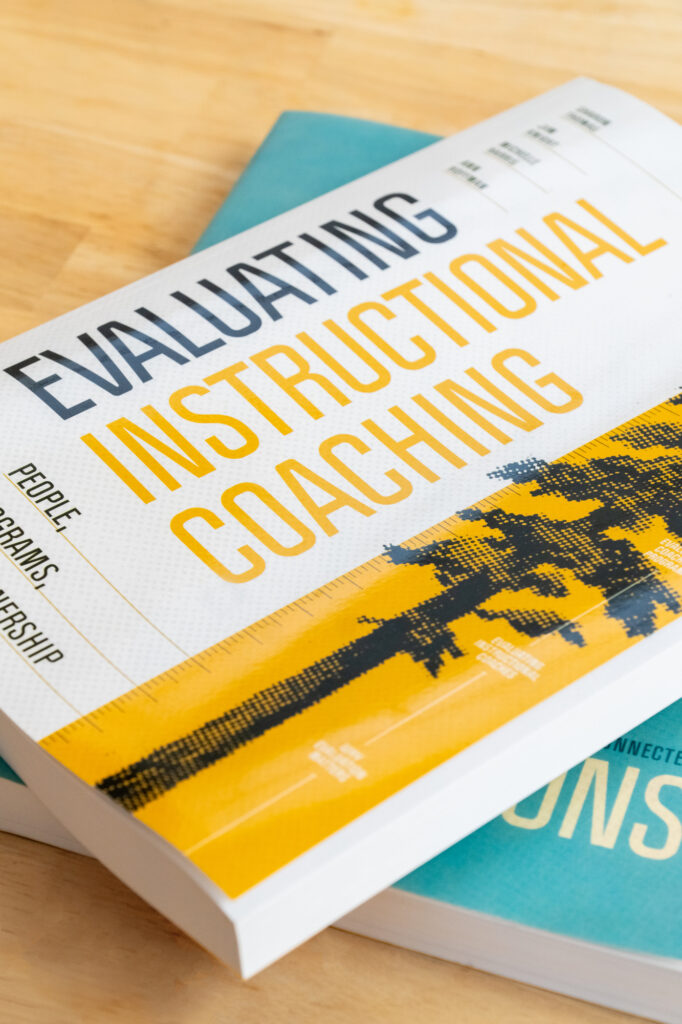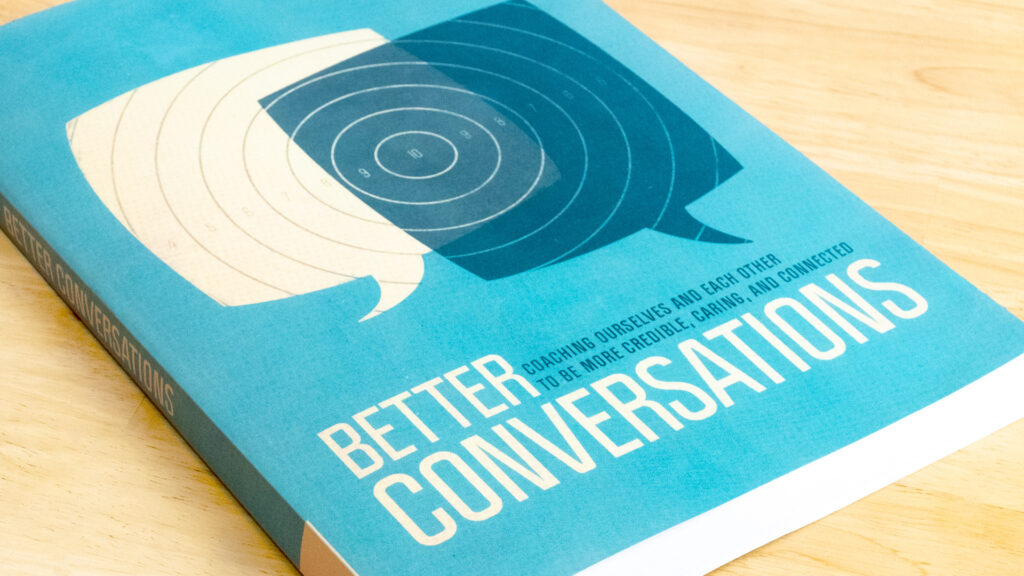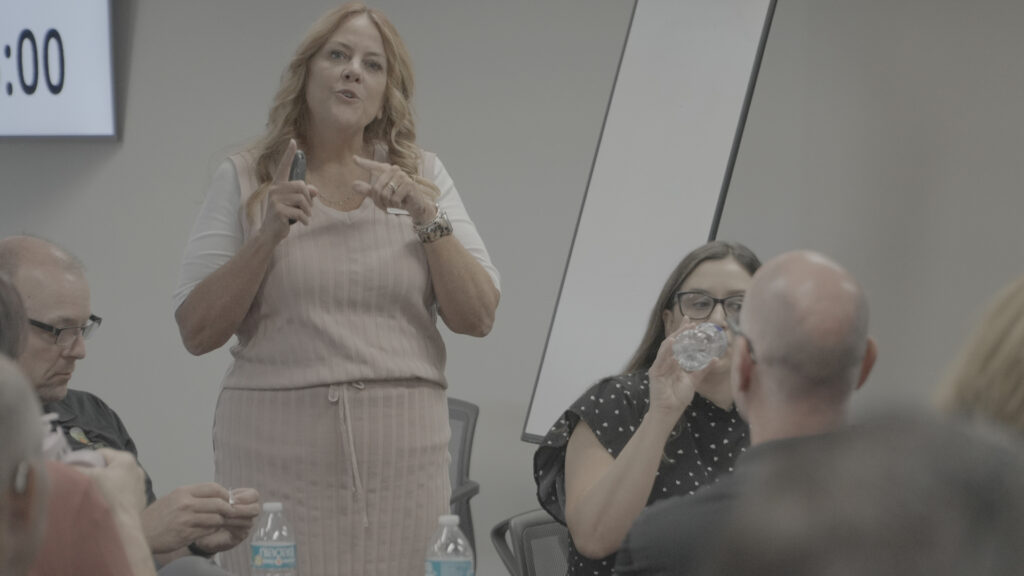“EYES WIDE OPEN!” whirled in my brain like a tornado destined to land. Current reality is what matters most! Videotaping is the best way to capture our work in action. As a result, I am now videotaping my coaching sessions.
Modeling the practice of videotaping myself normalizes this practice and has encouraged my partners to do the same. We have come to a mutual understanding of the positive value videotaping oneself in action has on our professional practice.
Videotaping myself pushes me beyond my comfort zone. Doing so allows me to see myself in action and wrap my mind around my current reality. How many times did I ask a question? How many times did I interrupt? How many times did I “Tell”? What was my affect like? Did I maintain good eye contact? This demonstrates a strength in vulnerability that is a gift to the teachers for whom I partner. They too become eager and willing to go beyond their set limits and obtain the benefits of the reflective practice videotaping yields.
Curiosity is a huge motivator for me to continue the implementation of videotaping myself on a regular basis. I am constantly asking myself, “How may I improve? What may I do to better support and assist my partners? What would Jim Knight do in this scenario?” My drive to serve others lights a spark from within and pushes me to find solutions and improve my ability to be an effective Instructional Coach.
The Proposal
I considered this for quite a while before I actually asked one of my partners for permission to videotape our collaboration. At first I considered bringing chocolates and roses. Then I decided to just be ME.
- Begin by expressing the importance of videotaping yourself to gain an understanding of your current reality. I usually say, “I am trying to gain a better understanding of my current instructional coaching practice. By videotaping our collaboration, I am afforded the opportunity to see my current reality, reflect upon my practice and develop strategies to improve. Would you feel comfortable with me videotaping our next session?
- Communicating to my partners that the act of videotaping myself helps me come to terms with my current practice definitely aids in the proposal. This is a tangible way to explain the “WHY” and provides a universal understanding of the positive impact videotaping has on our practice as educators.
- I then reassure my partners that the video footage will be completely confidential and for my eyes only. (Unless they would like to see it too)
Eyes Wide Open: Shift your lens, improve your practice
When I made the decision to begin the videotaping journey, I realized that I needed a tool to utilize as I was watching myself coach. With Jim Knight’s observation tools as a guide, I developed three of my own, one for each step in the Coaching Cycle, Identify, Learn, and Improve. The implementation of videotaping myself has had a profound effect on my coaching practice in a most transformational way. My reflection has become more purposeful and I am able to target areas that need to be restored. I am filled with a renewed sense of confidence and knowledge of how to proceed in ways that will benefit my partners and me.
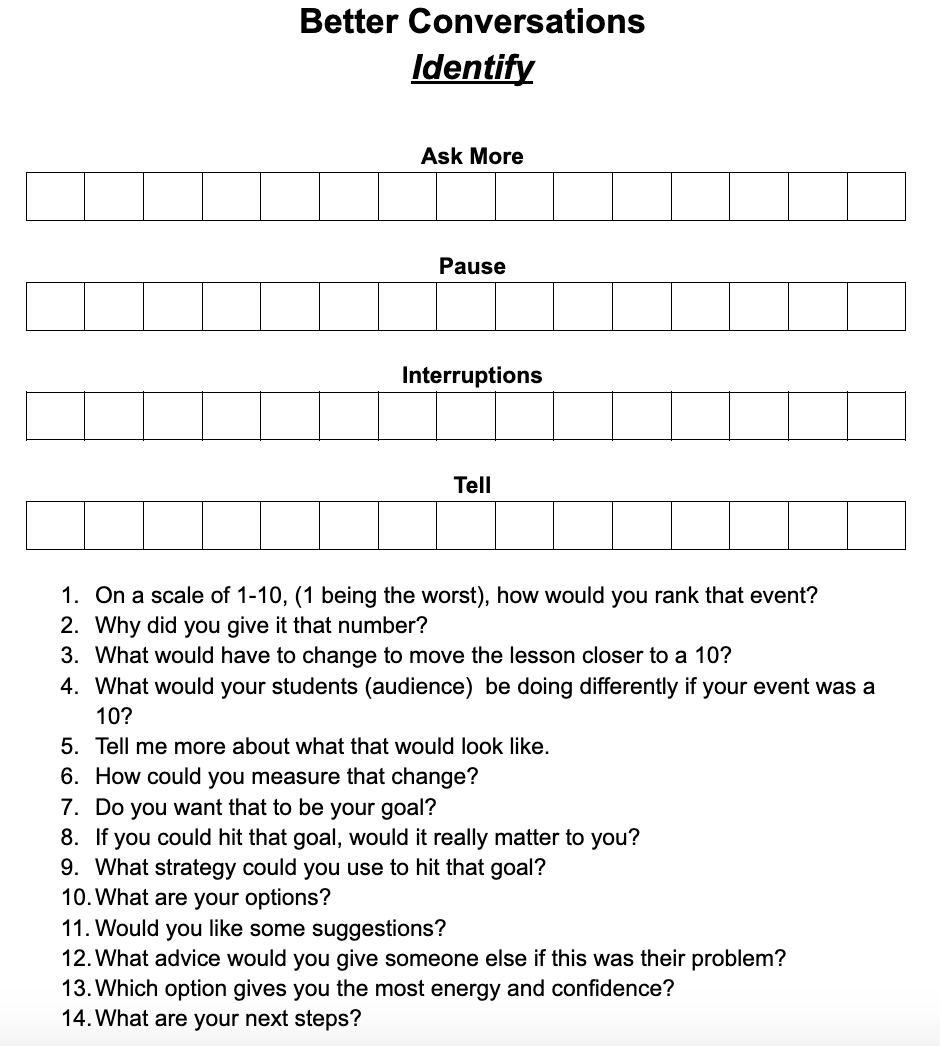
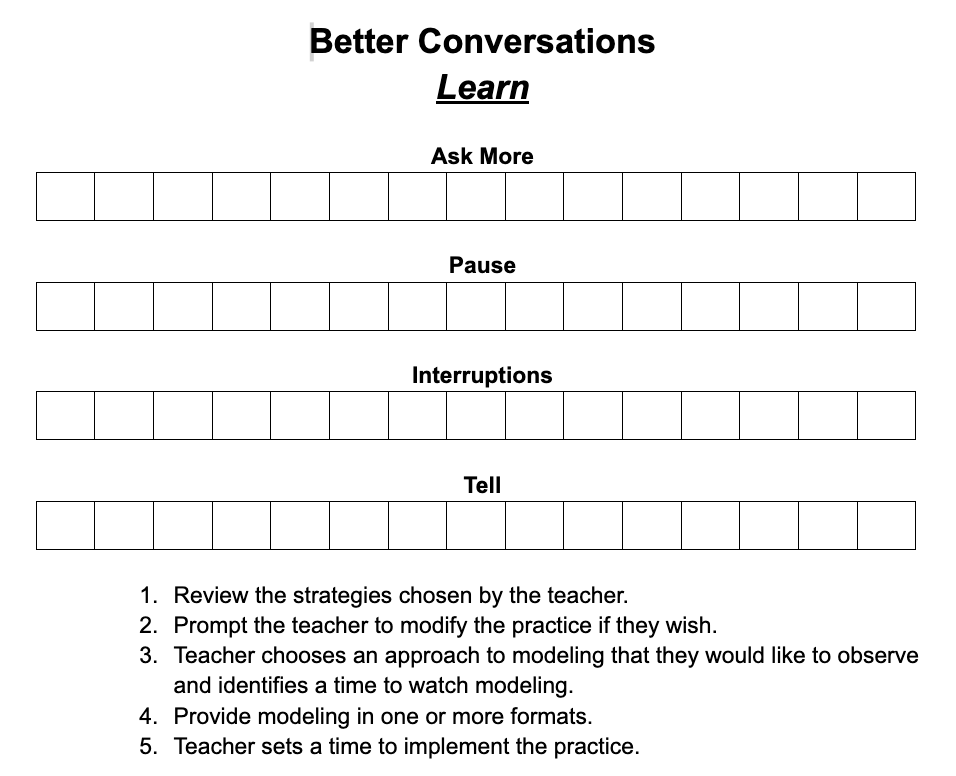
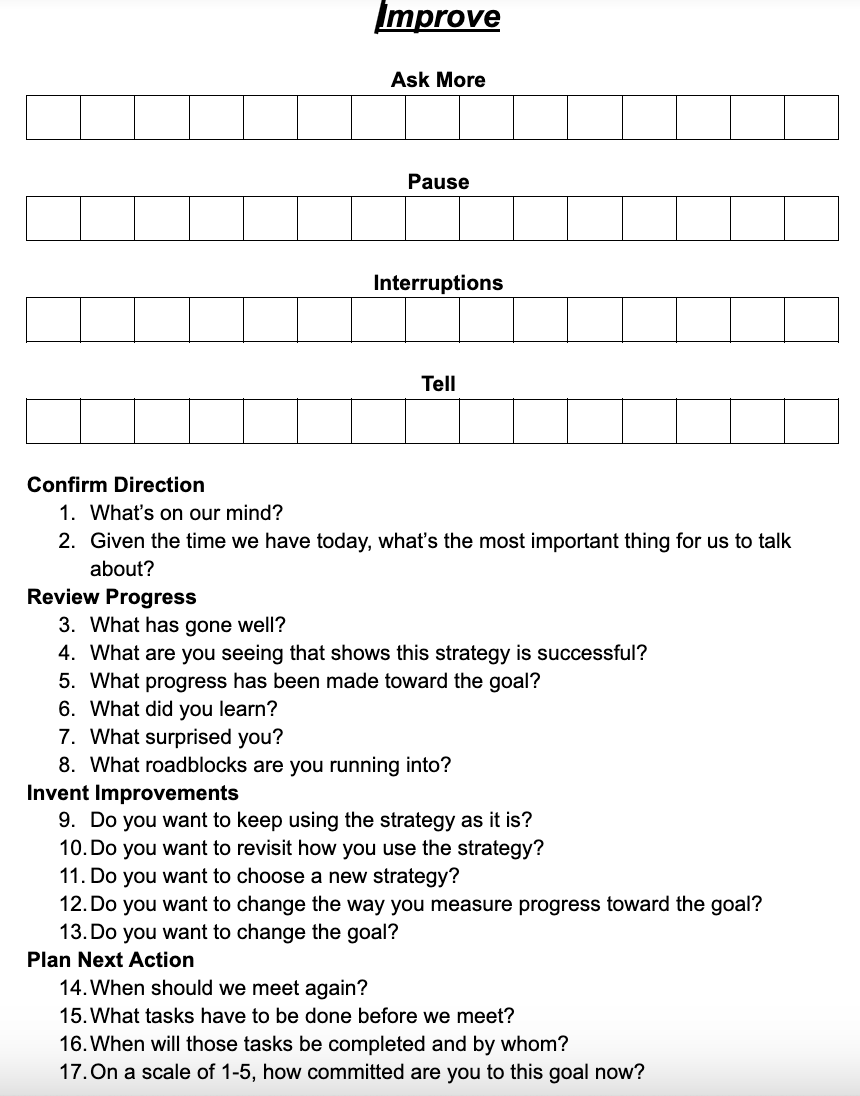
Learning Leads to Enlightenment
At times, the phrase “Lifelong Learning” is quite cliche, however, the sentiment still rings true. I have learned a great deal from my experiences as I view my videos and complete the data collection tools. Some of my moments of enlightenment are, but not limited to:
- Using Jim Knight’s question stems during each session provides a powerful foundation for positive, purposeful, and productive coaching conversations.
- The art of asking questions poses challenges when my partners are at a loss for ideas. This has driven me to create a list of possible questions to ask when my partners ask me to “Tell”.
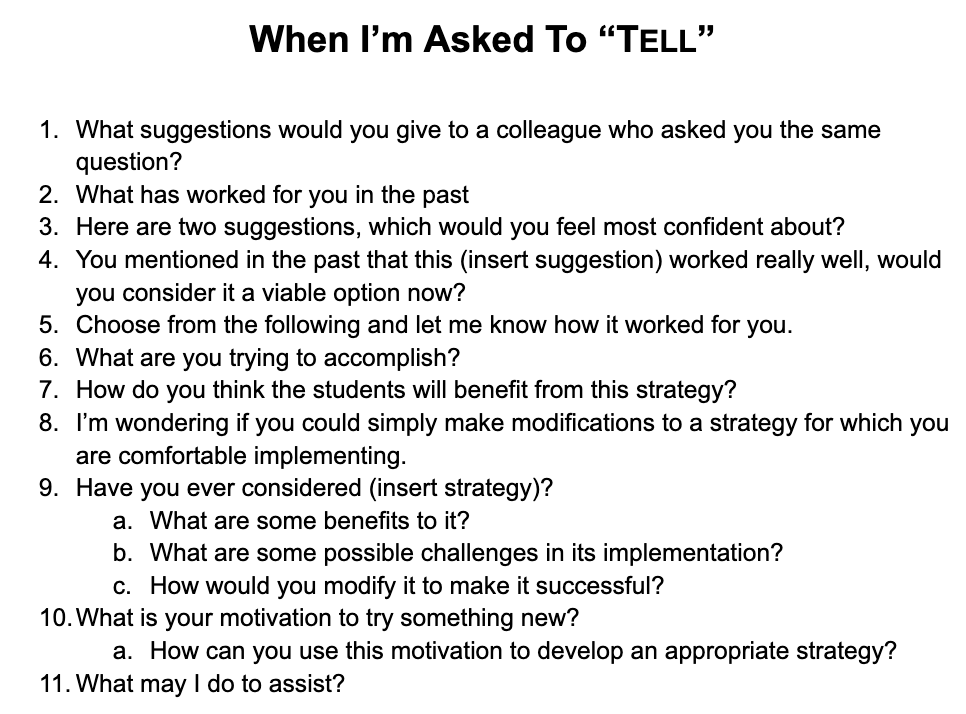
- I have a tendency to interrupt others when I become eager to share solutions.
- I make great eye contact when my partners are speaking to me, but need to be mindful of maintaining eye contact when I am speaking to them.
- Varying the way I begin engagement would provide more agency to my partners and create a more “open” coaching relationship.
- Starting each statement with the word “So”is redundant.
- Be mindful of filling the silence with “space holder” words.
- “Pause” is a gift to be used on a regular basis.
After looking at the data collection tools I have completed thus far I found, I am asking more questions, “telling” less, interrupting periodically, and pausing more frequently. I have also changed my lexicon to include better sentence starters.
Now What?
It’s go time! Videotaping yourself in action is a positive, purposeful, and productive way to reflect upon your practice, restore the way you collaborate with partners, and renew your passion for empowering others. You will obtain a clear understanding of your current reality and devise ways in which you can improve your practice. If you work on a team with other coaches, share some of your videos with them and ask for their feedback too. You will be a true trend setter, a change agent altering the culture of your school community, as you walk your talk and model the outstanding benefits videotaping has to offer.
Tips for Getting Started
- Believe you CAN!
- Acquire a videotaping device. I use an iPad provided by my District. However, you can use your computer or even your phone.
- Consider doing a simple audio recording. This can be equally powerful.
- Create data collection tools that reflect the elements of your practice you would most like to improve.
- Propose this experience to partners in which you have established the strongest, most trusting relationships.
- Just do IT!
- Watch, collect data, reflect, implement change, improve your practice!
Tag, You’re IT!!!
Have you ever used video to obtain your own current reality? What are some tips and tricks you have to offer others? Do you have any questions, insights, or suggestions to share? Please comment below so we can continue to grow our empowering Coaching Culture and walk our talk together.
Kate Bieschke
Instructional Coach
Harvard Community Unit School District 50
Harvard, Illinois
kbieschke@cusd50.org
